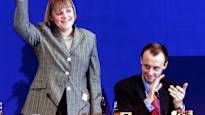Berlin Germany’s next Chancellor is likely to be Friedrich Merz;
Merz rises to lead Germany, which has deeply crisised in the Ukrainian war, failed energy policy, inflation and increasing migration criticism.
Based on the election result, it may be more weeks for the new government to be assembled.
To get rid of Merkel’s legacy
Merz is a veteran of politics who is strictly negative about receiving asylum seekers and represents the right wing of his party.
Merz has said that he considers migration to curb his most urgent task.
He has demanded that asylum seekers arriving from other Member States of the European Union be stopped at the German borders and reversed, even if it leads to problems with the border neighbors.
Merz is an old school conservative. He wants to get rid of the Christian Democratic Union, the CDU’s central heritage, which was left with a long -time leader Angela Merkel.
For the first hundred days Merz already has plan of action. It focuses on reducing bureaucracy, reducing taxation, and allowing retirees to work.
Not the female man
One of the problems of Merz’s political way has been that female voters have been alienated. The CDU’s own women’s organization has also often settled against her and support her counter -candidates in different choices.
Merz’s perceptions of family policy and sexes are old -fashioned. He has repeatedly been caught in sexist or otherwise discriminatory statements in both politics and business.
In 1997, Merz voted against the criminalization of a marriage rape, but is subsequently changed one’s mind.
Merz’s critics keep him distant due to the sudden speech style and arrogance. He exudes that he is an elite representative.
He describes himself as hard work, precise, practical and frankly.
Generally, his leisure time is mentioned that he is a millionaire flying his own private plane. Before moving back to politics, he said in a newspaper interview that he deserved “about a million” a year.
More support for Ukraine
It is exactly three years since the Russian attack on Ukraine.
As an opposition director, Merz sought more support for Ukraine and to the Ukrainians to provide German Taurus cruise missiles. In the election campaign, he no longer spoke of Tauri because the Germans’ views on supporting Ukraine are distributed.
Germany has only recently raised its defense expenditure above the current NATO target, or two percent relative to GDP. Merz has not told how quickly he wants to strengthen defense.
In any case, Merz is in favor of a more concrete approach to Ukrainian aid than the former Chancellor SPD.
Merz emphasizes the former Chancellor Olaf Scholzia More European cooperation.
He promises to return Germany to France as a European leadership, but also joins the eastern neighboring country in Poland. A collaborative pattern Called the Weimar triangle.
To politics already as a schoolboy
Merz was born in 1955 to a conservative, Catholic family in the state of Nordrhein-Westphalen. He joined the CDU Youth Association at the age of 17.
Merz began full -time in politics in 1989, when he was elected to the European Parliament. After one Strasbourg season, the father of three was selected for the German Federation.
During the Federation Merz, Merz specialized in financial policy.
He is said If necessary, it is ready to relax the famous German “debt brake” to fund the increasing defense expenditure. The debt brake binds German governments: it limits the budget deficit to a maximum of 0.35 % of GDP.
In Germany, Merz’s comment has remained a comment from the beginning of the millennium, when he comments on tax bureaucracy. In his view, the tax rules should be so simple that “they can be written on a cardboard platform”.
The economy in order
In 2002, Merz had to give up when Merkel was elected to the party’s leadership. The constant racing with Merkel eventually made Merz leave politics.
Merz moved to work in the business world. He worked as a lawyer at the law firm and led by Blackrock Finance. According to German media, the leap on the private side made Merz a millionaire.
Merkel represented a new CDU, an almost perfect opposite to Merz. Merkel was the first woman’s leader, the first politician in the DDR and, in addition to a religious background, Protestant. Merz is Catholic.
When Merkel announced his decision to abandon politics four years ago, Merz picked up politically again and set off in the leadership of the party.
After two unsuccessful entry attempts, he was elected chairman of the CDU.
Neoliberal Merz is in economic policy British Prime Minister Margaret Thatcher and the President of the United States Ronald Reagan Spiritable people. He wants to cut welfare expenditure and reduce support for people, “who don’t want to work.”
